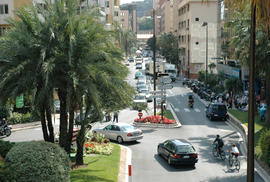Energy transition for businesses : how to implement sustainable mobility measures ?
The main ecological challenge we are currently facing is climate change. This phenomenon is mainly linked to greenhouse gas (GHG) emissions generated by industrialisation and widespread use of fossil fuels, especially oil used for transport. The repercussions of this phenomenon are now well-known: whether in terms of ecology (global warming, rise in natural disasters, etc.) or health (rise in cardiovascular and respiratory disorders, etc.). The consequences of air quality deterioration on the environment and on our health are considerable.
In this context of excessive GHG production, business trips and commuting between home and work generate 12 million tonnes of CO2 each year in France. They are the biggest source of greenhouse gas (GHG) emissions for office activities. Three-quarters of these trips are made by car with, mostly, one person per car. Furthermore, home to work commuting accounts for 30% of road transport use. While companies cannot force their employees to adopt sustainable mobility habits, they can put in place incentives and take action to reduce the impact of their fleets or their business trips.
For companies with a vehicle fleet, the first step is to rationalise it to ensure it’s adapted to the number of users and to actual needs. A high use rate of vehicles is a sign of a rational fleet. Thereafter, many actions can be put in place:
- Set up a car-sharing service. This involves pooling vehicle use by allowing employees to borrow a company vehicle, according to their needs and following reservation. By doing so, the size of the car fleet can often be reduced by 30 to 40%.
- Renew the fleet by gradually replacing vehicles over five years old with hybrid or electric vehicles.
- Set up “mobility credit”. Mobility credit significantly reduces fleet size by offering employees the possibility of swapping their company cars for a smaller vehicle or a car-sharing vehicle along with an allowance called "mobility credit" to finance their private trips (train, car rentals, taxi, etc.).
- Provide training on eco-driving to reduce fuel consumption and accidents.
Many measures targeting employees also exist to encourage them to adopt alternative and sustainable means of mobility. Apart from reducing costs, these practices also improve employee well-being:
- Encourage teleworking. Today, many studies show that this way of working improves overall employee performance and well-being at work due to a better work–life balance. The ecological impact of teleworking is also significant since commuting is reduced by working one or more days from home or from nearby third-party premises. Each employee who does not commute to work represents savings in fuel and energy. In the United States, it is estimated that if employees who could do so (40% of jobs) worked from home just one day a week, this would result in about 20 billion litres of oil being saved yearly. In light of the above, videoconferencing should also be encouraged as a way of holding meetings in replacement of certain car and plane trips.
- Promote soft mobility (walking, cycling, etc.) and alternatives (public transport, car-pooling, etc.) through awareness-raising events, information materials or incentive schemes such as covering train subscription fees or parking costs for employees who engage in carpooling. Making bikes available for short trips is also a simple initiative to put in place.
- Provide charging stations for employees with electric vehicles.
Improving mobility practices to move towards more sustainable habits is a first key step in energy transition for businesses. Many eco-friendly actions and schemes exist for reducing transport-related GHG emissions and incentives can take many forms by adapting them to the company's field of business and its employees’ uses. This necessarily requires communication, listening and awareness-raising so that new habits are continued in the long term.


[#YourMonaco]
— Gouvernement Monaco (@GvtMonaco) July 31, 2020
La Principauté se dote d'un nouvel outil de communication urbaine. https://t.co/5f1DsYi2No





